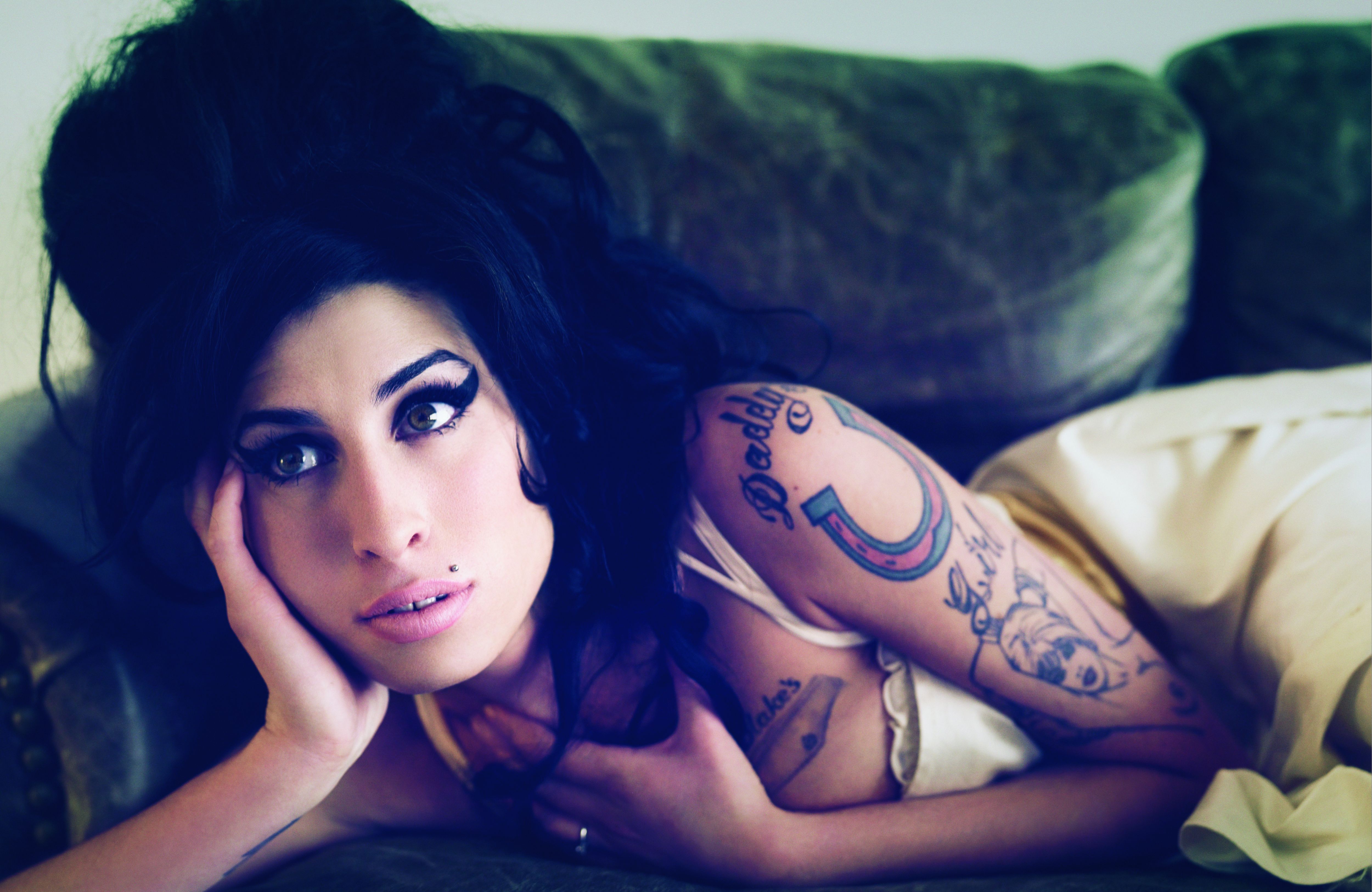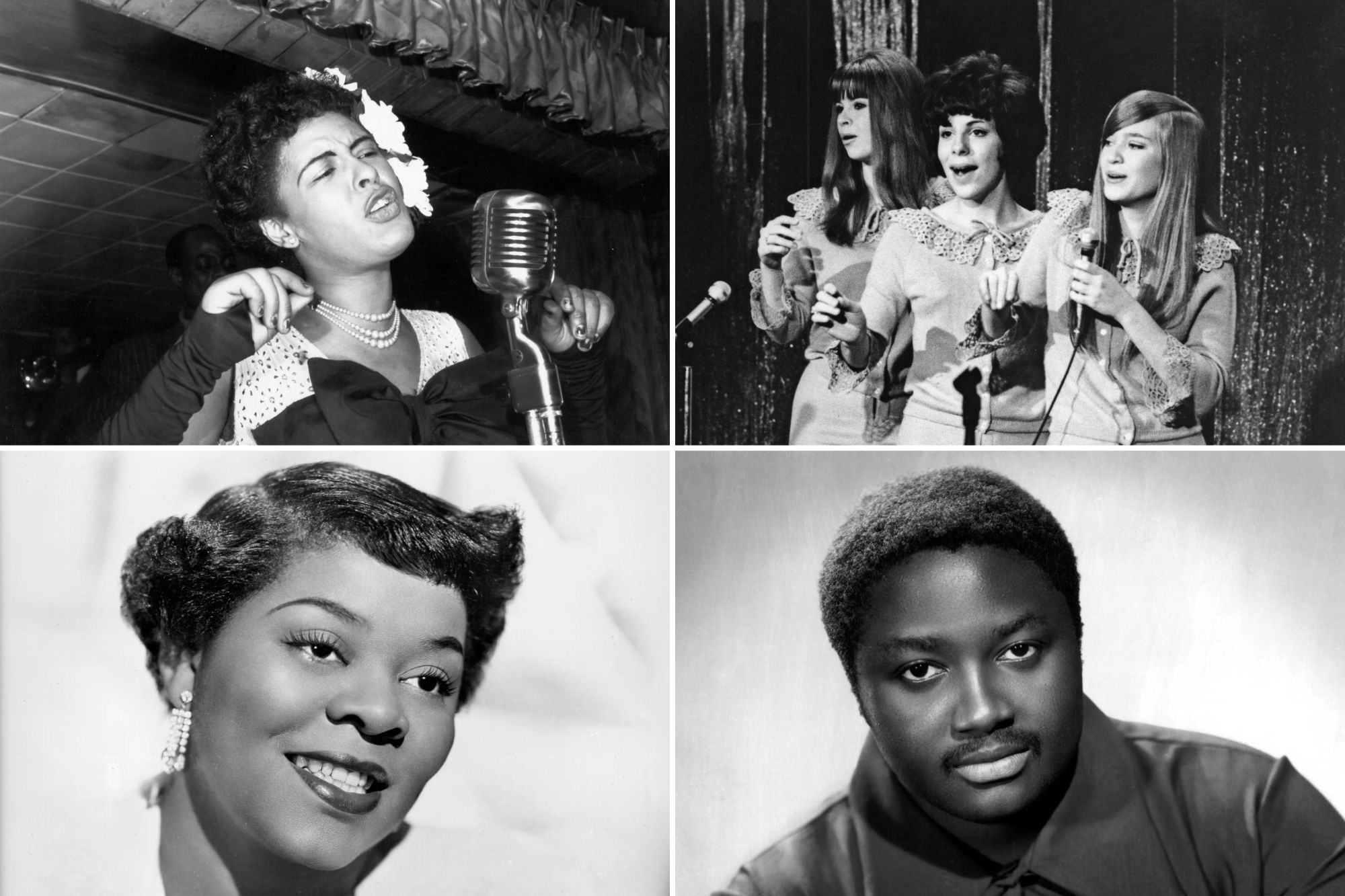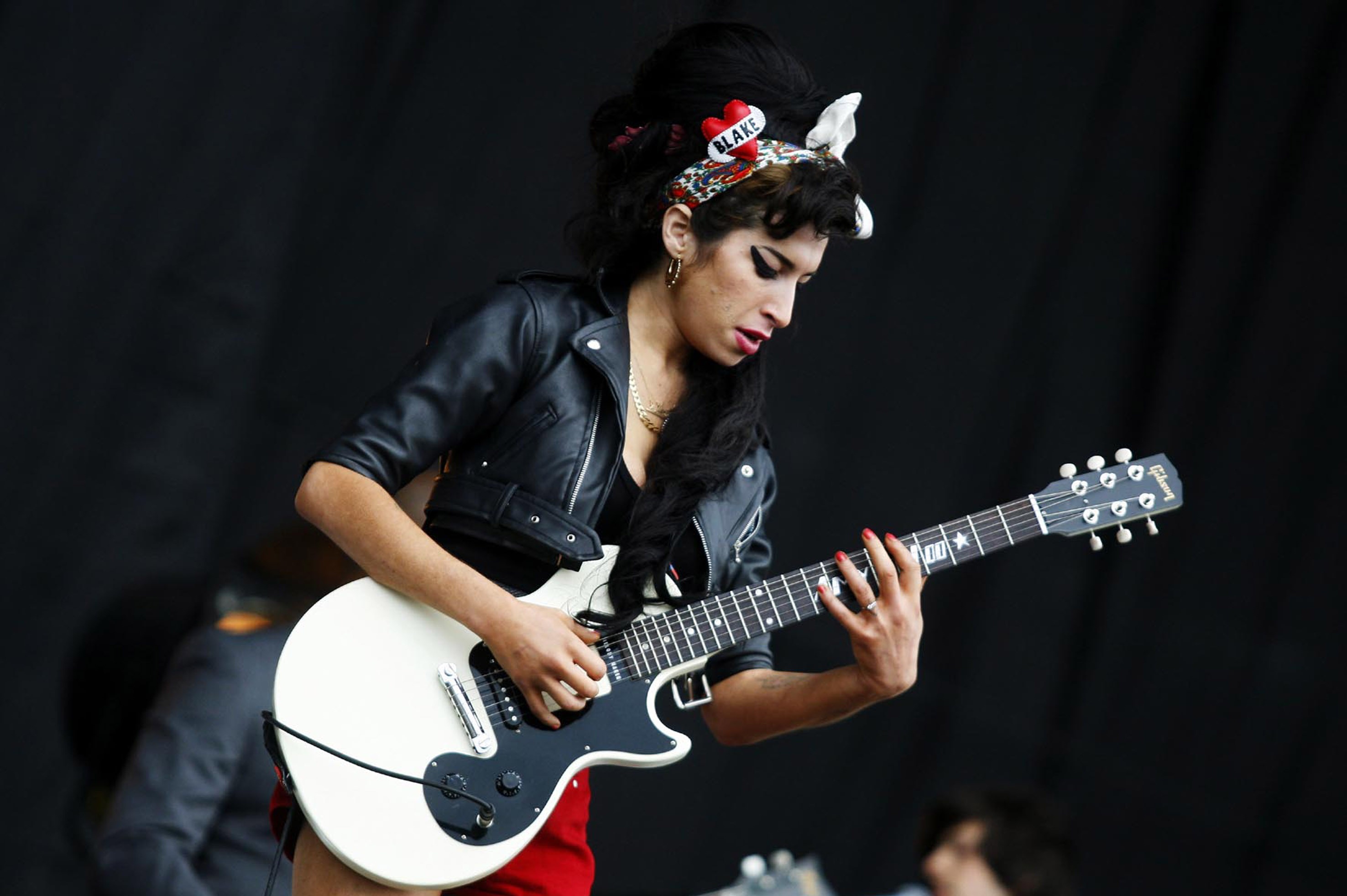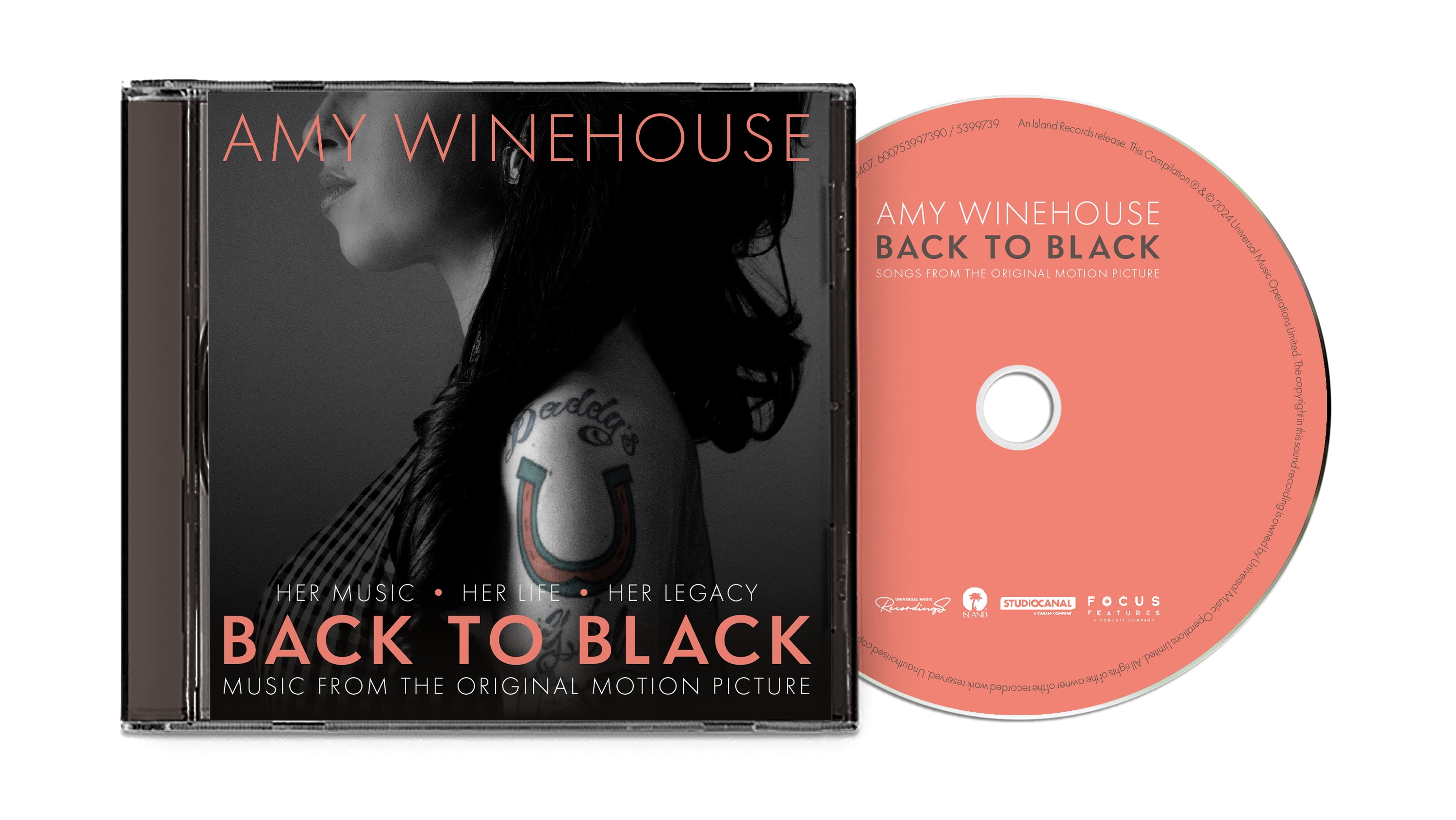AMY WINEHOUSE was like a shooting star – she burned bright for a brief moment, then she left us.
She only released two albums in her lifetime, her acclaimed debut Frank in 2003 and the massive Back To Black in 2006.
Her songs were raw, personal, witty and full of warmth.
They dealt with break-up and addiction in unflinching terms but they also betrayed a passion of a different kind.
Her profound and abiding love of music.
As a child, she had been surrounded by it thanks to her jazz singer grandmother Cynthia, professional musician uncles and, of course, her cabbie and part-time crooner dad Mitch.
READ MORE ON AMY WINEHOUSE
As a singer, she sang from her heart and soul with an unforgettable, uniquely expressive voice.
Lovingly-curated soundtrack
With the Back To Black film about Amy out this week, this is a good moment to reflect on her musical legacy and her influences.
There’s a lovingly-curated soundtrack album which gathers up her best-loved songs alongside tracks by her favourite artists.
It provides us with a chance to appreciate singers such as Billie Holiday, Dinah Washington, Donny Hathaway, The Shangri-Las, Minnie Riperton, Sarah Vaughan and more.
There’s also a nod to her punk spirit with the inclusion of Don’t Look Back Into The Sun by The Libertines and her love of 2-tone with Ghost Town by The Specials.
To help me delve into Amy’s music, I’ve been collecting insights from her close friend, bass player Dale Davis, musical director of her live band (still going strong 13 years after her untimely passing).
He believes that her musical family, particularly her beloved nan Cynthia, was a huge influence.
“Amy came from a history of singers,” he says. “There’s some good stock in there.
“But she was the one who took the mantle and became this massive creator.”
I’ve also been talking to the biopic’s music supervisor Iain Cooke, who went into forensic detail to help make Back To Black, starring the impressive Marisa Abela, as authentic as possible.
I’ve been listening to Sixties bands and girl groups and it came out in the writing on Back To Black. Stuff like The Shangri-Las and The Velvet Underground
Amy Winehouse
He says: “I did a huge amount of research into songs that were dear to Amy and her family and tried to build a world around them.
“We wanted the soundtrack to reflect those influences and show her musical journey.
“It was important to know what she listened to — and to discover the music Cynthia and Mitch introduced her to.”
I’m also drawing on telling insights from Amy herself from a 2006 SFTW interview with my colleague Jacqui Swift to mark the Back To Black album.
For instance, Amy revealed her restless nature around music, explaining that she’d dumped the jazzy vibe of Frank in favour of a sound more akin to Sixties girl groups.
“I’m not a jazz girl any more,” she decided, in typically impetuous fashion. “I’ve gone off it. I can’t even listen to Frank — in fact, I’ve never been able to.” Of Back To Black, she said: “These songs are more accessible because jazz is quite elitist. People didn’t get it.
“I’ve been listening to Sixties bands and girl groups and it came out in the writing on Back To Black. Stuff like The Shangri-Las and The Velvet Underground.”
The change of tack also inspired her image. Look at old pictures of The Supremes or The Ronettes and you’ll understand where the towering beehive came from.
Amy’s band leader Dale Davis was by her side for every one of her gigs from August, 2003, right up until her last in June, 2011.
‘She was a natural with every style’
He also witnessed first-hand her love of other artists when they played records or listened to the radio.
“Over the years we listened to a lot of stuff together,” he says. “The way Amy would feel music was just incredible. She felt it all.
“People sing along, as did she, but she had all the emotion that went with it.
“She was a natural with every style of music.”
He remembers one particularly jaw-dropping moment: “Three months after I started working with her, we were in a hotel room when Busta Rhymes and Mariah Carey came on with their song I Know What You Want.
She didn’t get too modern — with the exception of hip-hop
Dale Davis
“For the female part, Amy opened her mouth and sounded exactly like Amy but just as good as Mariah.
“At that point, I thought, ‘Wow, she is so special. She has her own and very distinctive voice’.”
I ask Davis, “So, who would have been on Amy’s playlist?”
“I know she listened to a lot of her brother Alex’s music before I knew her — grunge and Alanis Morissette,” he answers.
“Then, after I first met her, she was into hip-hop and R&B from the Nineties.
“That progressed as we went along to ska and 2-Tone. Obviously, there was a big reggae influence and then her love of Sixties girl groups came through.”
Dale lists soul, rock ’n’ roll and progressive jazz performers, too. “We heard Minnie Riperton, Billy Fury and Thelonious Monk,” he recalls. “She didn’t get too modern — with the exception of hip-hop.”
Bucket loads of style and sass
Next Davis, who keeps the singer’s legacy alive today with The Amy Winehouse Band, ponders which of her compositions grab him the most.
He says: “So on Frank, you’ve got songs like Love Is Blind with its humour and Stronger Than Me which is twisted and absolutely hilarious.
“But Moody’s Mood For Love is my favourite Frank track purely because it’s such a difficult tune. Her producer Salaam Remi said
Amy only learned it the week before the recording.
“To me, it shows her mastery of music. When we went on the road, I said, ‘Amy, why don’t we do Moody’s Mood?’ And she said, ‘Oh, but it’s really hard’.
“The next day, she’d nailed it and it sounded perfect.”
I love the way Me And Mr Jones swings, you can just imagine the mischief that’s gone into that song
Dale Davis
This brings us to the Back To Black album, steered by producers Mark Ronson and Remi, who somehow managed to create a sound that was both retro AND contemporary.
The songs charted Amy’s alcohol addiction and break-up with Blake Fielder-Civil in graphic detail but were delivered with bucket loads of style and sass.
“I love the way Me And Mr Jones swings,” says Davis. “You can just imagine the mischief that’s gone into that song.”
“And Love Is A Losing Game is a masterpiece as well as being prophetic.”
He continues: “You Know I’m No Good is great musically. Tears Dry On Their Own is difficult to play but Amy’s singing is amazing.
“Wake Up Alone is an example of her genius. I remember [the song’s co-writer] Paul O’Duffy saying he was with Amy for a month but she didn’t get her act together.
“Eventually, she had some lyrics — and then she sang nothing on the sheet!
“Of course they kept it. She had that ability to improvise and do it with total conviction.”
‘Not easy for a young white Jewish girl’
Amy held a boisterous rock crowd in the palm of hands in 2007 when she supported Arctic Monkeys at Old Trafford cricket ground in Manchester.
And back in 2003, two weeks after Davis started playing bass in her band, she wowed Notting Hill Carnival.
“It wasn’t easy for her obviously being a young white Jewish girl,” he says.
But, by the end of a “powerful performance”, they were on her side.
Davis adds: “I said to Amy, ‘You didn’t need a band behind you because you can do it on your own’. She had the incredible ability to sing with an orchestra on one song, then with just a guitar on the next. It was so effortless.”
Amy wasn’t fazed by superstars, either, notably when she appeared on Glastonbury’s Pyramid Stage in 2008 just before Jay-Z’s headline performance.
Davis says: “She met Jay-Z backstage. She was at that level where everyone wanted to talk to her.
“I was always amazed when I walked around with her. You’d get celebrities and great artists coming up and saying, ‘We love you Amy!’ ”
Another admirer of Amy’s “truly unique talent” is Iain Cooke, who tells me about the challenges of being music supervisor on the Back To Black movie.
He’d taken a similar role on TV dramas It’s A Sin and The Night Manager and on music-based projects Oasis: Supersonic and 1971: The Year That Music Changed Everything.
Crucially, he also worked on the Bafta-winning 2015 documentary Amy for which he first immersed himself in the singer’s world.
You couldn’t help but feel a little bit sorry for Amy. It was a life through a lens and it feels very tragic looking back
Iain Cooke, music supervisor, Back To Black movie
When it came to the Back To Black biopic, clearly a passion project for director Sam Taylor-Johnson, Cooke was given a make-or-break task to get it off the ground.
He says: “I had to negotiate the rights to Amy’s songs, principally with Universal Music Group for the recordings and Sony Music Publishing for the copyrights.
“Once we were able to use the songs the way we wanted, the film was officially green-lit.”
As for the song selection, he adds: “They were put in by the screenplay writer Matt Greenhalgh with input from Sam.
“They chart Amy’s career trajectory. We start off either solo or with a small band.
“By the time you’re seeing her at the Grammys (in 2008), there’s a horn section and backing vocalists. It was a real journey.”
It helped that Cooke’s own taste in music “aligned pretty closely”.
He says: “I’m a big fan of soul singers — Billie Holiday, Dinah Washington and Minnie Riperton.”
Most people who were around during Amy’s life in the spotlight have a view on that time and Cooke is no exception.
“As a recording voice, she was so distinctive. I was a fan of the first album, Frank, as well as Back To Black,” he says.
“But you couldn’t help but feel a little bit sorry for Amy. It was a life through a lens and it feels very tragic looking back.
“She had such a huge personality and bundles of talent but also demons that she wasn’t able to cope with.”
I ask Cooke for his impressions of Marisa Abela’s portrayal of Amy in Back To Black.
“I think she’s done a phenomenal job,” he answers. “All the live performances in the film are Marisa singing.
“It was a monumental task but Sam Taylor-Johnson wanted to embody the spirit of Amy.
“There’s a moment early on when Marisa sings What Is It About Men unaccompanied, no trickery, and you could hear a pin drop. I also love her Glastonbury performance. It captures the essence of Amy’s original show. It’s wild and free and fantastic.”
Back To Black also has an atmospheric score by Nick Cave and his Bad Seeds accomplice Warren Ellis.
“They were Sam’s one and only choice,” says Cooke. “The score underpins Amy’s feelings of isolation and claustrophobia when things are getting on top of her. It is really sensitively handled.”
Cave also composed the poignant Song For Amy which features at the end of the film.
The last words are from Amy herself and give a clue to why she was such a great artist.
Talking about the Back To Black album, she told SFTW: “It’s about a relationship that didn’t survive.
“When there’s a problem I can’t get through, I write a song about it to get myself past it.
“My songs are very honest.”







